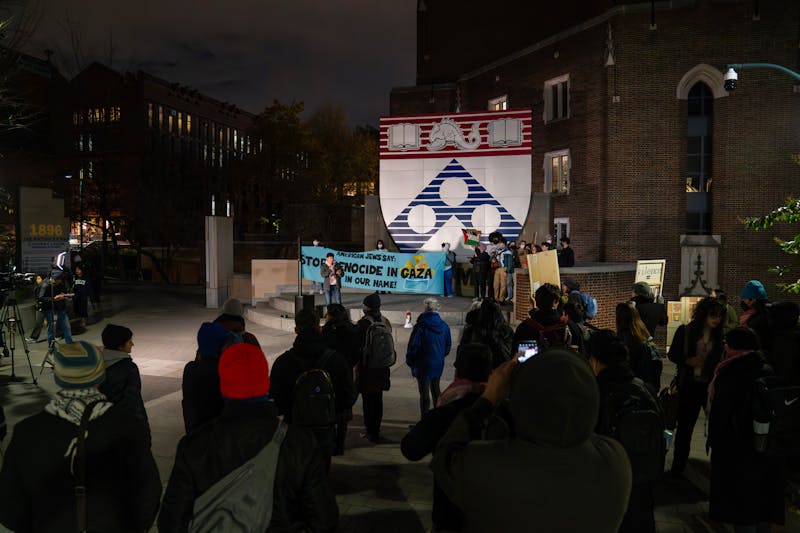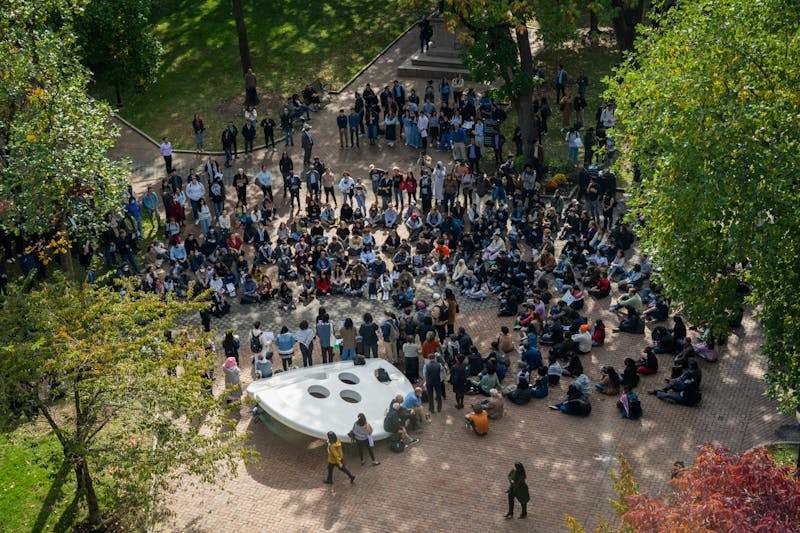
Penn Chavurah, a progressive Jewish student group, screened a film critical of Israel amid attempts from Penn administrators to delay the screening.
Nearly 100 community members attended the "Israelism" film screening in Meyerson Hall on Nov. 28 after several University attempts to postpone the event. The documentary was followed by a Q&A with producer of the film Erin Axelman, where Axelman shared their own process with the documentary and answered questions from Penn community members.
Students with a PennCard were unable to enter the School of Design building without someone inside opening the door for them. Once inside the building, individuals were checked by police to make sure they possessed a PennCard. Another check for a PennCard also occurred outside the screening room, which Chavurah said the Middle East Center had reserved. Penn Police were also present.
A Penn Medicine student, who requested anonymity, said that they felt the level of security was “completely unreasonable.” While they were eventually allowed entry, the student said they were initially denied because they presented a hospital ID issued by Penn Medicine instead of a PennCard.
Prior to the film, College senior and Penn Chavurah organizer Jack Starobin said that despite having a reserved room, the Vice Provost for University Life “said there may be disciplinary consequences if we continue the screening.”
A University spokesperson wrote to The Daily Pennsylvanian that students did not inform Penn of future dates for the screening after postponing it for safety concerns, prompting them being referred to disciplinary action.
"The student organizers disregarded the University’s direction and secured a different space to show the film," the spokesperson wrote. "Consistent with University policy, the student organizers will be referred to the Office of Community Standards and Accountability to determine whether a violation of the Code of Student Conduct occurred."
Starobin added that the impact of screening "Israelism" is important since “what it means to be Jewish on this college campus [has become] a fraught question."
College senior Olivia Haynie, another organizer with Penn Chavurah, said that the University's recent statements and actions have made it a "very stressful time on campus."
In addition to frustration from University actions, Haynie also said that as a Jewish student, she has been discouraged by the reactions from the broader Jewish community toward trying to bring a different perspective to the issue and having an honest conversation.
Lily Brenner, an Engineering sophomore and member of Penn Chavurah, said that “the administration needs to remind itself on who it needs to serve.”
In the live Q&A following the screening of the film, Axelman expressed frustration with Penn administrators who attempted to cancel the event, adding that they have not watched the film.
"It is a profound lack of intellectual discipline to be censoring films and academic material without interacting with it,” Axelman said.
The Daily Pennsylvanian previously reported that a University spokesperson said that Penn postponed the screening until February after discussions with the Division of Public Safety and administrators to ensure the film can be viewed "safely and constructively." The spokesperson said that Penn "[appreciates] the understanding of Penn Chavurah, who have been both passionate and respectful of their fellow Penn community members."
Penn's response prompted dozens of University community members to rally in protest of the decision on Nov. 27.
On the same day as the screening, Penn Middle East Center director Harun Küçük submitted his resignation, according to the Penn chapter of the American Association of University Professors. Faculty committee members wrote that the organization was "alarmed" by the resignation and claimed that Küçük submitted his resignation in response to ”inappropriate pressure from administrators.”
During the Q&A session Axelman said that seeing a shift in people's perspectives on Israel has given them hope for their community.
“It's a very painful process, much easier for me than many people. But I think it's also a necessary process. And again, a lot of the adults are now changing. A lot of my generation has already changed and now a lot of our parents are listening to us,” Axelman said.
A student in the crowd shared their own story of how their mother didn’t want them to come watch the film, labeling it as antisemitic and pro-Nazi, without having seen the film. The student asked Axelman about how to engage in dialogue with those who they disagree with. In response, Axelman noted that they believe in the film’s ability to get people talking and encouraged the audience to start that dialogue.
Another Penn student, who requested anonymity out of fear of retaliation, said they came to the film screening because its controversy piqued their interest, adding that the Q&A section was a good opportunity to talk to someone who is knowledgeable about the Israel-Hamas war.
“I’ve been trying to educate myself more but was also getting burnt out from doing it so much over the past month, but this event seemed like a good way to learn more,” the student said.
The Daily Pennsylvanian is an independent, student-run newspaper. Please consider making a donation to support the coverage that shapes the University. Your generosity ensures a future of strong journalism at Penn.
Donate












